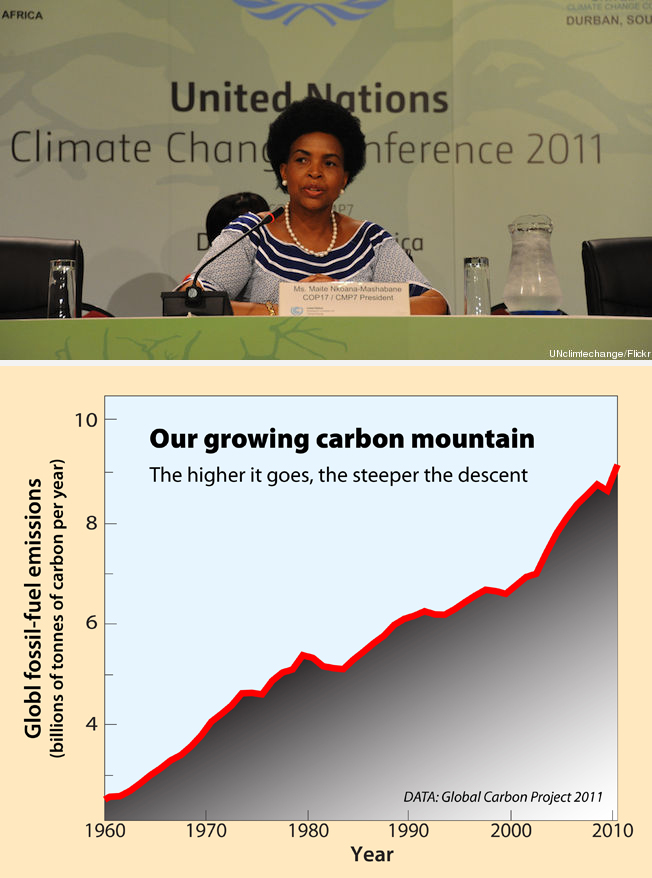The Durban meeting was a classic case of putting off till tomorrow what’s too hard to manage today. [20 December 2011 | Peter Boyer]

TOP: The face of Africa at the Durban meeting—Maite Nkoana-Mashabane, South Africa's foreign minister and president of the conference. BOTTOM: The reason why any delay on global agreement is unacceptable.
A pet irritation of my mother was seeing jobs left unfinished. I used to think she targeted me unfairly, but I came to see how kids are past masters at finding something else to do instead of the job at hand.
Kids? How about everyone? What about the garden that needs attention, or the ceiling that’s been waiting a year to be painted? How about this column that needs writing every week?
We’re all past masters at procrastination. When we put our political representatives and their delegates under the pump for their failure to get something done, such as a climate agreement at Durban, we may as well be holding a mirror up to ourselves.
Of all displacement activities, the things we do to avoid doing the thing we have to do, nothing beats a meeting. While all that talk can give the appearance of progress, unless a meeting turns into a brawl (or an orgy) there’s no actual physical outcome.
The principal outcome of the 17th Conference of Parties to the United Nations Framework Convention on Climate Change, which ended last week in Durban, was even less real than usual: an exercise in delayed action officially called a “Platform for Enhanced Action”.
Government negotiators at the meeting agreed to put off a decision to commit to emissions targets until 2015. Not only that — they delayed actual commitment until 2020. That’s serious procrastination. If Nobel had nominated procrastination for a prize, Durban would win hands down.
We have to talk if we’re to achieve anything outside our own immediate circle. The climate-energy crisis is a global one demanding global solutions, which means global meetings. Durban met expectations, which were that it would achieve pretty well nothing.
Each year about this time, the Global Carbon Project releases its report on emissions for the preceding year. Last year’s Cancun meeting was told they were heading downward in 2009.
Any faint hopes that we might be getting somewhere were dashed in this year’s report. Global emissions of carbon from burning of coal, oil and gas broke all records in 2010, rising to over nine billion tonnes, which equates to over 30 billion tonnes of carbon dioxide.
As the report pointed out, the driver of carbon emissions is economic growth. In 2010 sluggish US and European economies were more than made up for by growth in developing countries, which have rendered completely ineffectual all the world’s measures to cut emissions.
The longer our emissions continue to rise, the steeper must be our descent on the other side — the more rapid and decisive our emissions cuts — if we’re to avoid catastrophic climate change. I know everyone’s getting tired of this message, but how else can it be said?
Many governments are behaving as if such facts can be willed into oblivion. In the lead-up to Durban Russia and Japan grumbled about how carbon measures constrained their economies. Canada decided it was all too hard and backed right out of the Kyoto Protocol. And the biggest emitters, the US and China, blamed each other for inaction.
The former top UN climate official Yvo de Boer declared that climate meeting negotiators had lost touch with reality and the leaders of their governments seemed to have lost control of the process.
This was the depressing backdrop for Durban. Whether from government or the numerous non-government organisations that give colour to an otherwise drab collection of suits, everyone at the meeting knew they were pushing the proverbial waste matter up a very steep hill.
There’s always hope. Durban wasn’t completely futile. It kept the dialogue going by bringing together representatives of all the world’s countries, and it forced them to admit that their present policies and targets will have to be strengthened to stop dangerous warming.
The meeting agreed that a new treaty protected by international law, with developing countries inside the tent alongside developed ones, will govern future global climate efforts. And it established a Green Climate Fund to help the poorest countries address climate challenges.
But the Green Climate Fund is yet to be financed, and the failure of delegates to secure commitments to immediate or near-term action, in the face of scientific evidence that delay is dangerous, is a setback that will come back to bite in years ahead.
The muted responses of politicians and bureaucrats, spin merchants and lobbyists back in the world’s capitals is an indication that even they are aware that this meeting is nothing to brag about.
Governments, in Australia and everywhere else, continue to mask their inaction with feel-good statements and plans which have no physical outcome. They undermine their own authority by continuing to bend to the will of vested private interests, corporate lobbyists and think-tanks.
They and their climate summit negotiators alike, as Yvo de Boer observed, are in a parallel universe, a bubble that shields and separates them from the realities of life for the mass of the world’s people and from the damage that humans have done to the natural environment.
In the New Year, in a rare show of bipartisanship, Australian government and Coalition politicians will get big pay rises while keeping their much prized lifetime travel Gold Pass with its big personal carbon footprint. (Only newly-elected politicians are to be excluded.)
If only the climate crisis could excite such unity of purpose!
